(完整版)汉语成语英译
汉译英 成语的翻译

Strike while the iron is hot. 趁热打铁。 Walls have ears. 隔墙有耳。 Constant dropping wears the stone. 水滴石穿。 Actions speak louder than words.
事实胜于雄辩。
成语翻译要注意的事项
汉语成语的语言特色,即形象鲜明、常用典故、
音韵和谐,翻译时应尽可能地保留这些特色。 然而由于汉英两种语言和文化的巨大差异,汉 语成语的这些特色很难全部在译文中得以再现, 此时译者必须有所舍弃,采取适当的翻译策略 以确保主要信息的传递。 现代翻译学认为,译文与原文在意义上应动态 对应,不要形式对等。因此,从原文的深层意 义出发,汉语句子当中的四字词组在译成英语 时都有可能与英语句中的单词、短语、习语甚 至整句相对应。
Don’t count your chickens before they are hatched. 不可过早乐观。 Every cloud has a silver lining. 天下没有绝对的坏事。 Among so many well-dressed and cultured people, the country girl felt like a fish out of water. 同这么多穿着体面而又有教养的人在一起,这位乡下 姑娘感到很不自在。 She was born with a silver spoon in her mouth; she thinks she can do what she likes. 她生长在富贵之家,认为凡事都可随心所欲。
TRANSLATION APPRECIATION
1.It is too late to grieve when the chance is past. 坐失良机,后悔已迟。 2.It’s never too late to learn. 活到老,学到老。 3.Joy at its height engenders sorrow. 乐极生悲。 4.Justice has long arms.
汉译英_成语的翻译 2

二、 将四字词组译成短语,如介词短语、
副词短语、不定式短语
这种方法往往是套用英语中最简单的词
组或句型。
某位领导的讲话要求外交人员“立场坚
定、目光远大、头脑敏捷、业务熟练、 才华出众、风格高尚”, “A Chinese diplomat should be firm in stand, broad in vision, swift in wit, qualified in profession, outstanding in talent, noble in character.”
三、套用英语中意思相同及功能对等 的习语
四字词组中有很大一部分是固定词组,即成语。成语
往往带有浓厚的民族色彩和地方色彩。翻译时除了要 忠实地表达原文意义之外,还要尽可能保持原文成语 的形象比喻,丰富联想,修辞效果以及其民族、地方 特点等。有的成语和英语中的习语在内容和形式上都 相符合,双方不但有相同的意义和修辞色彩,并且有 相同或大体相同的形象比喻。汉译英时,如果遇到这 种情况,不妨直截了当地套用英语同义习语。这样的 译文可能会增色不少,基本能实现四字词组的美学价 值转移。
谚语俗语
亡羊补牢
Mend the fold after the sheep is stolen. 外来语 一尘不染 Free of dust 心花怒放
Be wild with joy\be elated
新生成语
分秒必争
Seize every minute and second Race against time 百花齐放
香港人、爱护香港人的旭日辉映下,满怀信心,升锚 启航,向着振兴中华,祖国统一的宏伟目标乘风奋进。 We are embarking on a new era. With the respect and trust from the entire nation, we will be much more equipped to sail forward with confidence and with conviction.We will play a part in facilitating the reunification of the entire nation, and bringing a better life to all in the nation.
成语翻译

课程与教学论 xx
内容
一,英语成语汉译 二,汉语成语英译
三,结
语
英语成语汉译 引 言
英语成语的分类及其译法
其他及其译法 小结
英语成语汉译
英语成语以其精辟、形象、生动
等特点,牢固地确立了它在英语中的 重要地位。无论是在书面语,还是口 头语言里,英语成语都发挥着越来越 显著的作用,其数量正在日益扩大、
汉语成语英译
粗枝大叶
(不是with big branches and large leaves)
而是: to be crude and careless 无孔不入 (不是to get into every hole) 而是:to take advantage of every weakness
扬眉吐气
eat one’s words
误译:食言
正译:不承认自己说了错话
英语成语汉译
pull sb’s leg 误译:拉后腿 正译:愚弄某人,开某人玩笑 move heaven and earth
误译:翻天覆地
正译:想方设法,千方百计 dog-eat-dog 误译:狗咬狗 正译:残酷争夺,人吃人的关系
小
英语成语汉译
对这部分英语成语,我们可以直接翻译它们的 字面意义,因为一般中国读者都能理解这部分成 语字面意义后面地比喻意义。又如: the fifth column 第五纵队---比喻间谍 crocodile tears
鳄鱼的眼泪---比喻假慈悲
wash one’s hands of
洗手不干---撒手不管
talk through one’s hat
胡言乱语 to be as poor as Job 家徒四壁 neither fish nor fowl
关于英汉成语
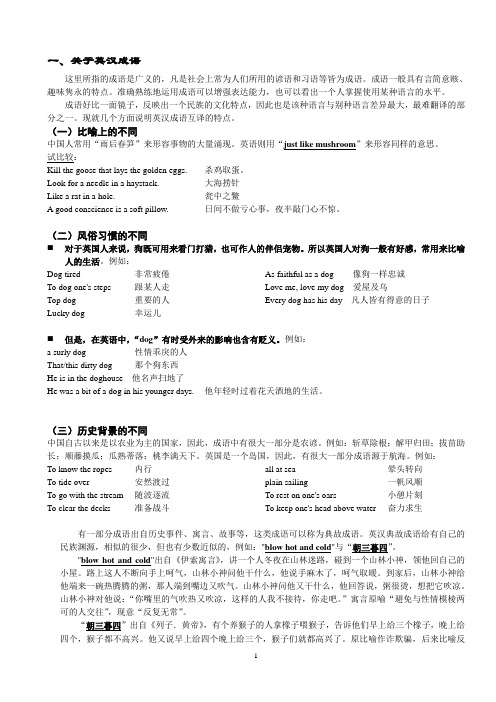
一、关于英汉成语这里所指的成语是广义的,凡是社会上常为人们所用的谚语和习语等皆为成语。
成语一般具有言简意赅、趣味隽永的特点。
准确熟练地运用成语可以增强表达能力,也可以看出一个人掌握使用某种语言的水平。
成语好比一面镜子,反映出一个民族的文化特点,因此也是该种语言与别种语言差异最大,最难翻译的部分之一。
现就几个方面说明英汉成语互译的特点。
(一)比喻上的不同中国人常用“雨后春笋”来形容事物的大量涌现。
英语则用“just like mushroom”来形容同样的意思。
试比较:Kill the goose that lays the golden eggs. 杀鸡取蛋。
Look for a needle in a haystack. 大海捞针Like a rat in a hole. 瓮中之鳖A good conscience is a soft pillow. 日间不做亏心事,夜半敲门心不惊。
(二)风俗习惯的不同⏹对于英国人来说,狗既可用来看门打猎,也可作人的伴侣宠物。
所以英国人对狗一般有好感,常用来比喻人的生活。
例如:Dog tired非常疲倦To dog one's steps跟某人走Top dog重要的人Lucky dog幸运儿As faithful as a dog像狗一样忠诚Love me, love my dog爱屋及乌Every dog has his day凡人皆有得意的日子⏹但是,在英语中,“dog”有时受外来的影响也含有贬义。
例如:a surly dog性情乖戾的人That/this dirty dog那个狗东西He is in the doghouse他名声扫地了He was a bit of a dog in his younger days. 他年轻时过着花天酒地的生活。
(三)历史背景的不同中国自古以来是以农业为主的国家,因此,成语中有很大一部分是农谚。
例如:斩草除根;解甲归田;拔苗助长;顺藤摸瓜;瓜熟蒂落;桃李满天下。
湖北省翻译大赛成语翻译总结(一)

翻译:1.人无远虑,必有近忧【英译】He who gives no thought to the futhure is sure to be beset by worries at hand.2.善有善报恶有恶报。
【英译】Good will be rewarded with good, evil with evil.1.旁观者清。
【英译】The on-looker sees most of the game.2.岁月不待人。
【英译】Time and tide waits for no man.1.不入虎穴,焉得虎子。
【英译】Nothing venture, nothing have.2.公事公办。
【英译】Business is business.1.高处不胜寒。
【英译】He sits no sure that sits too high.2.磨刀不误砍柴功。
【英译】Sharpening your axe will not delay your job of cutting wood.1.巧妇难为无米之炊【英译】You can't make something out of nothing.2.智者千虑,必有一失【英译】No man is wise at all times.1.静以修身。
【英译】A light heart lives long.2.海纳百川。
【英译】All rivers run into sea.1.无风不起浪【英译】There is no smoke without fire.2.一朝被蛇咬,十年怕井绳【英译】Once bitten, twice shy.1.一意孤行【英译】That boy is always going his own way. He won't listen to his parents' advice.2.口蜜腹剑【英译】A honey tongue, a heart of gall.1.远亲不如近邻【英译】Distant kinsmen mean less than close neighbors. / A near neighbor is better than a distant cousin.2.一见钟情【英译】Fall in love at first sight.1.一言既出,驷马难追【英译】A word spoken is past recalling.2.物以类聚,人以群分【英译】Birds of a feather flock together.1.瑞雪兆丰年【英译】A snow year, a rich year.2.情人眼里出西施【英译】Beauty lies in the love's eyes.1.条条大路通罗马。
汉语成语的英文翻译

本末倒置put the cart before the horse
必由之路the only way
闭关自守close the country to international intercourse
独一无二的unique unmatched unparalleled
度日如年one day seems like a year
断章取义garble quote out of context
对牛弹琴whistle jigs to a milestone Cast pearls before swine
胆小如鼠cannot say boh to a goose
胆战心惊的funky
淡泊明志not seek fame and wealth
道貌岸然be sanctimonious
得过且过drift along muddle along
得天独厚的advantaged
得心应手handy with facility
诚心诚意sincere desire
承上启下a connecting link between the preceding and the following
吃苦耐劳tough
吃里扒外live on sb. while helping others secretly
痴心妄想 胡思乱想wishful thinking
白手起家build up from nothing
百里挑一one in hundred
百折不挠be indomitable
[英语学习]中国成语中英文对照idioms
![[英语学习]中国成语中英文对照idioms](https://img.taocdn.com/s3/m/6fa5c99459eef8c75ebfb34a.png)
[英语学习]中国成语中英文对照idioms译员必须“后退”:汉语成语的英译死亡之后,士兵们在死亡之地,他们将活着.比路高一英尺,比魔法高一英尺。
最高的爬一英尺,魔鬼爬十英尺.高预防胜于治疗预防胜于治疗.新官上任三把火新扫帚扫净.塞翁失马不幸可能是因祸得福路遥知道马的力量已经增长了很长一段时间,人们会看到它。
一次长途旅行考验一匹马的力量,一项长期的任务证明一个人的性格.沧海一粟沧海一粟岁月不等人时间不等人.经验是一个好老师。
经验是老师.小型汽车笔记:假装[常用短语]扭转局势vi.扭转局势创造是世界上的第一件事。
当某人倒下时,打他当一个人倒下时打他是有耳朵的。
墙有耳朵.开夜车开夜车.坦率真诚地说当他遇到问题时,他总是向他的配偶敞开心扉盗贼之间有荣誉。
狗不吃狗.一个好机会应该得到另一个一种仁慈是另一种仁慈的代价.损人利己注:配偶(示例)他从未提到过他的配偶他从未提到过他的妻子。
充实自己:自我充实、自我利益和智慧,都会有损失。
不骄傲地赢,优雅地输不以成功宣布,也不以失败区分。
智者没有困惑。
聪明人没有困惑哪里有烟,哪里就有火。
无风不起浪.(哪里有烟,就有火给百合花镀金百合利用这个麻烦来维持收支平衡。
和尚不能管理寺庙。
小型汽车笔记:荷马:n.荷马(希腊诗人)事实上,很难找到摆脱这种局面的方法。
古怪的两个头比一个.好混日子情人眼里出西施。
对某事物表现出特别的偏爱所有的女孩都喜欢凯文,但他只喜欢玛丽我们什么时候分开最好消除敌意,而不是收缩它.反对归反对,但没有办法,只好抛开不管眼不见,心不烦.舌尖上口误有时会给你带来麻烦小型汽车笔记:一只教堂老鼠:一个乞丐的口误:口误,口误,口误,口误非常恭顺的表情他总是对他的老板毕恭毕敬浅薄的人稍有成就就会忘记应该持有的态度。
早起的鸟儿有虫吃欲速则不达欲速则不达匆忙,低速.给狗起个坏名字,然后绞死它。
给一只狗起个坏名字,然后绞死它搅水捕鱼如果你没有足够的钱,你就得付钱。
对不起,但是我不知道该怎么办。
【管理资料】汉译英词语翻译--成语翻译--3汇编

成语英译方法(p79-81)
➢直译法 ➢意译法 ➢套译法 ➢加注法 ➢增译法
2020/7/3
2
直译法
➢按照字面意义直译可以让译 文读者准确理解其意义、且 不违背译文语言规范、不引 起错误联想的成语,都可以 直译。
2020/7/3
3
-直译法-1
➢有些汉语成语没 ➢口蜜腹剑 有形象的比喻意 ➢ to be honey义,它们的字面 mouthed and 意义也就是它们 dagger-hearted 的实际意义。对 这些成语,我们 当然可以采取字 面翻译。
➢ to drain a pond to catch all the fish
turning over one’s hand ➢ 玩火自焚
➢ to get burnt by the
fire kindled by oneself
2020/7/3
6
汉语成语英译
➢ 挥金如土
➢ to spend money like dirt
2020/7/3
4
-直译法
➢ 劳苦功高 ➢ to have spent toilsome labour and won
distinctive merits ➢ 屡教不改 ➢ to fail to mend one’s ways after repeated
admonition ➢ 牢不可破 ➢ to be so strongly built as to be indestructible
paper
and
bewitched gold
2020/7/3
11
意译法
➢ 单枪匹马
➢海阔天空
➢ to be singlehanded in doing sth.
口译成语翻译
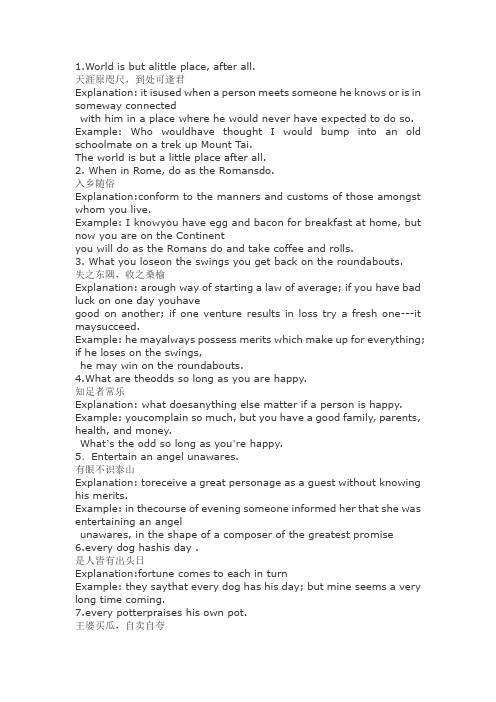
1.World is but alittle place, after all.天涯原咫尺,到处可逢君Explanation: it isused when a person meets someone he knows or is in someway connectedwith him in a place where he would never have expected to do so. Example: Who wouldhave thought I would bump into an old schoolmate on a trek up Mount Tai.The world is but a little place after all.2. When in Rome, do as the Romansdo.入乡随俗Explanation:conform to the manners and customs of those amongst whom you live.Example: I knowyou have egg and bacon for breakfast at home, but now you are on the Continentyou will do as the Romans do and take coffee and rolls.3. What you loseon the swings you get back on the roundabouts.失之东隅,收之桑榆Explanation: arough way of starting a law of average; if you have bad luck on one day youhavegood on another; if one venture results in loss try a fresh one---it maysucceed.Example: he mayalways possess merits which make up for everything; if he loses on the swings,he may win on the roundabouts.4.What are theodds so long as you are happy.知足者常乐Explanation: what doesanything else matter if a person is happy. Example: youcomplain so much, but you have a good family, parents, health, and money.What’s the odd so long as you’re happy.5.Entertain an angel unawares.有眼不识泰山Explanation: toreceive a great personage as a guest without knowing his merits.Example: in thecourse of evening someone informed her that she was entertaining an angelunawares, in the shape of a composer of the greatest promise6.every dog hashis day .是人皆有出头日Explanation:fortune comes to each in turnExample: they saythat every dog has his day; but mine seems a very long time coming.7.every potterpraises his own pot.王婆买瓜,自卖自夸Explanation:people are loath to refer to defects in their possessions or their familymembersExample: he saidthat his teacher considered his work brilliant, but I would rather hear it fromhisteacher’s own mouth. Every potter praises his own pot成语翻译(二)1.Pain past is pleasure.(过去的痛苦就是快乐。
成语翻译

意译法有些习语由于文化因素的影响,在翻译时无法保留原本语句的字面意义和形象意义,也无法找到同义的习语借用,这时可将原文的形象更换成读者所熟悉的另一个译文形象,从而转达出原文的语用目的,译出隐含意义。
例如汉语中的“落花流水”通常是指被打得大败,译成英文便是“to be shattered to pieces”;“乌烟瘴气”形容情形混乱不堪,则可用“chaos”一个词来表达;“望子成龙”在英译时不能译出其形象,那么翻译成英文时就应该用简短的语句来形容该词的含义:“to expect one's son to become an outstanding personage”;又如:“The dog that will fetch a bone will carry a bone.”在译成汉语时,其中的字面形象dog、bone都不能直译,只能舍弃它的字面意义和形象意义,译出隐含意义:“对你说别人坏话的人,也会说你的坏话”。
同类的例子还有“fight like cat and dog”,如果按字面意义直译成汉语,虽保留了原文形象,但不符合汉语的表达习惯,所以可以根据该习语在文中的意思进行意译,例如:“We still love each other very much ,but we fight like cats and dogs.”译文:“我们常吵吵闹闹,但仍很相爱。
”借用法由于人类在感情、对客观事物的感受及社会经历等方面不免存在相似之处,所以英汉习语中存在着少量相同或近似的习语,这些习语字面意义、形象意义相同或近似,隐含意义则完全相同。
也就是说,此类习语的字面意义和形象意义所传达出的文化信息是相同的,这样的习语则可以采用“借用法”进行互译。
如英语中的“Practice makes perfect.”与汉语中的“熟能生巧”、“Example is better than precept.”与“身教胜于言传”、“Easy come, easy go.”与“来得容易,去得快”、“Strike while the iron is hot.”与“趁热打铁”等句子词汇都可在英汉之间有所对应;同理,如汉语中的“隔墙有耳”一词,英语中则有“Walls have ears.”与之对应。
汉语常用成语英文翻译
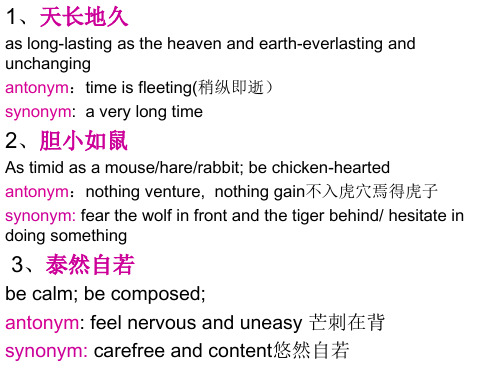
11、泪如泉涌 泪如泉涌
• tears flowing down like a spring; tears welling up in one’s eyes; tears pouring down one’s face antonym:belly laugh;horselaugh synonym :have one's face covered with tears
15、孤注一掷 、
stake all on one cast of the dice; risk everything on a single venture synonym: put all the eggs in one basket; antonym: burn one's boats; do or die; sink or swim
16. 纸上谈兵 engage in idle theorizing / 纸上谈兵: armchair strategy 17. 白费唇舌 waste one's breath/ to speak 白费唇舌: to the wind 18. 一文不名 be penniless/ without a 一文不名: penny to one’s name
• 29. 水落石出every thing comes to light • 30. 粗枝大叶careless/ with heavy hand • 31. 扬眉吐气standing up with one’s head up/ feeling with pride and elation • 32. 无孔不入get in by every corner/ seize every opportunity • 33. 大张旗鼓 on a large scale
汉语数字成语的英译

Chinese expressions with “百” “千” “万”
5)源于生活的成语,先直译字面意义,后进行意译
三纲五常 three superiorities and five virtues (ruler superior to subject, father superior to son, husband superior to wife; benevolence, righteousness, propriety, wisdom and fidelity) 三纲五常是封建社会的道德规范,三纲五常中的纲是提 网的总绳,意思是居于主要地位。三纲分别是,君为臣 纲,父为子纲,夫为妻纲。五常指五种行为准则,即仁、 义、礼、智、信。
13
“13”在英美人看来是一个十分不吉利、十分霉气的数字 据古文记载:夏娃和亚当偷吃禁果之日正是13号星期五。 另据基督教传说:耶稣的弟子犹大(Juda),为贪图30元 银元而出卖了耶稣,恰巧耶稣被钉死在十字架上的日期也是 13号星期五(所以除数字“13”外,“星期五”也是英美人 忌讳的一个日子)。
3)舍弃数字意译
过程:完全舍弃原数字
三令五申 give repeated orders and injunctions 一波三折 striking one snag (困难)after another 一板一眼 following a prescribed (规定的,法定的 )pattern in speech or action
汉语成语英译资料汇编

汉语成语英译四法I. 直译法直译法(literal translation)能够保留原文的巧喻及形式,是翻译成语的最好方法。
但直译法必须在不违背译文的语法习惯,又不致引起误解的情况下才能使用。
例如:川流不息→flowing past in an endless stream犬马之劳→to serve like a dog or a horse易如反掌→as easy as turning over one's hand触景生情→the scene brings back memories无可救药→ beyond cureII. 意译法有的成语用直译法无法表达其意,我们只好忍痛割舍原文的巧喻,改以意义(free translation)来翻译。
例如:木已成舟→What's done is done.杞人忧天→unnecessary anxiety东施效颦→ blindly copying others and making oneself look foolish姜太公钓鱼,愿者上钩→Willingly fall into the snare.III.同义成语借用法有的汉语成语在内容和形式上都能够与英语成语相通,这时我们可以用同文的英语习语或成语来翻译汉语成语。
例如:隔墙有耳→ Walls have ears.绞尽脑汁→to rack one's brains一文不名→ without a penny to one's name谋事在人,成事在天→Man proposes, God disposes.说曹操,曹操到→Talk of the evil and he is sure to come.对牛弹琴→to throw pearls before swineIV. 注释法翻译汉语成语时,我们还可采用注释法(explanation),运用该种方法的好处是能介绍本国成语的特色,并能兼顾比喻、形式、清晰各方面。
汉译英词语翻译--成语翻译--3
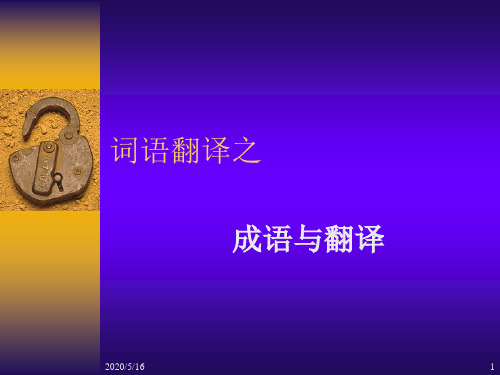
-直译法
劳苦功高 to have spent toilsome labour and won distinctive merits 屡教不改 to fail to mend one’s ways after repeated admonition 牢不可破 to be so strongly built as to be indestructible
2013-7-28 2
Hale Waihona Puke 成语英译方法(p79-81)
直译法 意译法 套译法 加注法 增译法
2013-7-28 3
直译法
按照字面意义直译可以让译 文读者准确理解其意义、且 不违背译文语言规范、不引 起错误联想的成语,都可以 直译。
2013-7-28
4
-直译法-1
有些汉语成语没 口蜜腹剑 有形象的比喻意 to be honey义,它们的字面 mouthed and 意义也就是它们 dagger-hearted 的实际意义。对 这些成语,我们 当然可以采取字 面翻译。
2013-7-28 10
意译法-1
然而,汉语成语并非 粗枝大叶 每条都能按字面翻译, to be crude and 有些成语的比喻形象 careless /cf. ( confer ) 是译文读者不能接受 with big branches and 的。这种情况下,我 large leaves 们可以根据成语的实 无孔不入 际意义灵活地翻译。 to take advantage of every weakness/cf. to get into every hole
16
Practice-意译法练习
1. 开门见山 1. to come straight to the point cf. to open the door and see the mountain 2. 扬眉吐气 2. to feel proud and elated cf. to raise the eyebrows and 3. 大张旗鼓 let out a breath 3. on a large and spectacular scale 4. 毛遂自荐 4. to volunteer one’s service 5. 倾城倾国 5. to be exceedingly beautiful
汉语成语英译汉语成语英译汉语成语英译汉语成语英译

汉语成语英译汉语成语英译汉语成语英译汉语成语英译好人好事good people and noble deeds层出不穷continue to appear深居简出lead an isolated life劳逸结合combine business with pleasure不胜感激be grateful beyond expression鞭长莫及beyond one’s reach一箭之遥be within a stone’s throw日新月异change with each passing day每况愈下go from bad to worse三言两语in a few words错失良机miss the golden chance固执己见stick to one’s own opinion引人入胜so attractive爱不释手can’t stand leaving it aside can’t stand putting it down 忙忙碌碌be as busy as a bee易如反掌be as easy as ABC全力以赴go all out对。
了如指掌have sth. at one’s fingertips捷足先登The early bird catches the worm.浑水摸鱼fish in troubled waters蒙在鼓里be in ignorance of sth.双目失明be blind in both eyes同甘共苦share joys and hardships无愧于心have a clear conscience无忧无虑free from anxiety公事公办business is business成败关键之时the crucial moment of success or failure源源不断的音乐a constant flow of music利用某人年幼无知take advantage of one’s youth and ignorance竭尽全力do everything possible不顾个人安危with no thought for one’s own safety淡薄名利take little notice of the honors寓教于乐combine education with recreation理论联系实际combine theory with practice因人而异depend on the individual势均力敌的比赛a close match尽管困难重重in spite of the difficulties卧病在床be sick in bed乐于助人be ready to help others略知一二get a rough idea of sth.勤能补拙hardwork can make up for a lack of intelligence衣衫褴褛be poorly-dressed使人一头雾水confuse sb.使人热泪盈眶bring tears to sb.尽收眼底sth. be within sight一时语塞sb. be at a loss for words半途而废give up halfway连绵不断的战火constant wars一臂之力lend sb a helping hand一点一滴every little bit一刻千金every minute is precious一目了然be clear at a glance一视同仁treat sb equally一无所知know nothing about一心一意heart and soul三番五次again and again, repeatedly三三两两in twos and threes三心二意be of two minds四面八方(from ) all directions四通八达extend in all directions五颜六色colouful, of various colours 十全十美be perfect in every way不厌其烦take great pains / be patient不分胜负come out even不甘落后be unwilling to lag behind不可思议unimaginable不速之客uninvited ( unexpected ) guest 不言而喻it goes without saying that不由自主can’t help不足为奇not at all surprising迫不及待can’t help不知不觉unconsciously毫不在意don’t / doesn’t care at all 举世闻名be world-famous举足轻重occupy a decisive position名不符实unworthy of one’s name名不虚传deserve the reputation井然有序be in good order井井有条be in good order跃跃欲试be eager to have a try全面发展develop in an all-round way 安然无恙be safe and sound半途而废give up halfway义不容辞one’s duty to do sth全力以赴go all out for / spare no efforts 千方百计by every possible means持之以恒persevere家喻户晓widely known, known to all默默无闻unknown to the public树立榜样set a good example for理所当然naturally, of course数以万记tens of thousands of世世代代from generation to generation心不在焉absent-minded梦想成真come true, become a reality迫在眉睫extremely urgent刻不容缓of great urgency无时无刻all the time无所事事have nothing to do毫不犹豫without hesitation坐失良机miss the golden chance横贯平原go across the plain鼎力相助try every means possible to help you欣喜若狂be wild with joy不遗余力spare no effort/ go to all lengths不相上下be equally matched不由自主can’t help不知所措be at a loss不负众望live up to one’s expectations重蹈覆辙make the same mistake again出类拔萃stand out from one’s fellows / be distinguished 触目惊心be shocked at the sight of sth吹毛求疵find fault with others大功告成have achieved great success大失所望be greatly disappointed得意忘形go / be wild with joy大惊小怪make a fuss颠三倒四disorderly; confused; reverse喋喋不朽talk one’s head off价廉物美cheap and fine / a good buy坚持不懈persevere in doing岌岌可危be at risk年老体弱old and weak心烦意乱be upset热泪盈眶be filled with tears置若罔闻turn a deaf ear to视而不见turn a blind eye to筋疲力尽worn out / tired out / exhausted热情洋溢with enthusiasm同甘共苦share joys and sorrows焕然一新take on an entirely new look固步自封limit one’s own progress挑三拣四be particular about与时俱进keep pace with times举棋不定can’t decide / make up one’s mind虎头蛇尾do things by halves一夜成名be famous overnight一蹴而就reach the goal in one step一筹莫展be at a loss what to do一成不变fixed and unchangeable哑口无言have nothing to say如愿以偿achieve what one wishes不知所措be at a loss/not know what to do不以为然not consider sth right不着边际not to the point不由自主/情不自禁cannot help doing长年累月over the years/ year in and year out层出不穷keep emerging持之以恒/锲而不舍persevere in / insist on doing出类拔萃/鹤立鸡群be outstanding吹毛求疵find fault with从容不迫take one’s time / calmly大失所望greatly disappointed独一无二/绝无仅有unique多才多艺/才华横溢gifted in many ways耳目一新find everything fresh and new 风调雨顺favourable weather风烛残年remaining years共同语言common language / same ideas古往今来throughout the ages光明正大honest / just and honourable焕然一新take ion a new look后悔莫及feel regretful火上浇油add fuel to the flame家常便饭routine艰苦奋斗hard struggle见义勇为do whatever one sees right街谈巷议/道听途说street gossip/own talk尽人皆知known to all / common knowledge精益求精constantly improve sth聚精会神/专心致志be all attention口是心非/ 心口不一say yes and mean no苦思冥想think hard老弱病残the old and the weak力争上游aim high良师益友good teacher and helpful friend聊胜于无better a little than none了如指掌be familiar with闷闷不乐/无精打采depressed / in low spirits梦寐以求long for sth day and night名副其实be worthy of the name目光短浅/鼠目寸光short-sighted弄虚作假play tricks气喘吁吁short of breath弃旧图新/推陈出新turn over a new leaf千方百计/想方设法by every possible means / try one’s best 千载难逢golden opportunity前因后果cause and effect勤工俭学/半工半读part-work and part-study program穷乡僻壤remote and backward place全神贯注be absorbed in sth全心全意/一心一意heart and soul人山人海ocean of people日月如梭/时光飞逝Time flies.如饥似渴do sth with great eagerness善始善终start well and end well舍生忘死risk one’s life深思熟虑think deeply and carefully木已成舟What’s done cannot be undone.十全十美perfect时不我待make the better use of time实事求是seek truth from facts视若无睹/熟视无睹take no notice of / ignore sth手不释卷always haver a book in his hand熟能生巧Practice makes perfect.数不胜数/不胜枚举countless死得其所/视死如归die a worthy death四面八方from all directions谈笑风生talk and laugh cheerfully天涯海角ends of the earth通情达理understanding and reasonable万无一失perfectly safe望尘莫及too far behind to catch up为所欲为do whatever one likes无可奈何be helpless无名英雄unknown hero无所适从not know what to do习以为常be used / accustomed to sth喜气洋洋/兴高采烈full of joy / joyful相依为命depend on each other for survival心不在焉absent-minded心口如一say what one thinks心满意足be perfectly satisfied袖手旁观look on with folded arms一筹莫展find no way out一见钟情fall in love at first sight一箭双雕kill two birds with one stone一目了然be clear at a glance一窍不通know nothing about一事无成accomplish nothing一言以蔽之to sum up in a word以貌取人judge a book by its cover以身作则set an example置若罔闻turn a deaf ear to置之不理pay no attention to众所周知as is known to all助人为乐take pleasure in helping others自力更生rely on one’s own efforts自食其力earn one’s own living自始至终from beginning to end字里行间between the lines总而言之in short/ all in all / in a word祖祖辈辈from generation to generation罪有应得deserve one’s punishment与时俱进keep pace with the times精疲力竭in high spirits异口同声say sth. with one voice成年累月all the year round改过自新/重新做人turn over a new leaf易如反掌as easy as ABC每况愈下go from bad to worse不遗余力/竭尽全力spare no efforts to一事无成achieve nothing固执己见stick to one’s own opinions难以言表more than one can say成千上万tens and thousands ofProverbs1. Time and tide wait for no man. 时不我待。
英译汉语常用--成语,谚语,典故,歇后语
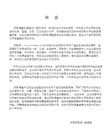
如火如荼 Like a raging fire
如鱼得水 To feel just like a fish in water
入木三分 To enter three-tenths of an inch into the timber
塞翁失马 The old man of frontier lost his horse
闭门造车 Building a cart behind closed doors
病入膏肓 The disease has attacked the vitals
草木皆兵 every bush and tree looks like an enemy
吹毛求疵 Blow apart the hairs upon a fur to discover any defect
蚍蜉撼树 An ant trying to shake a big tree
破釜沉舟 Smashing the cauldrons and sinking the boats
破镜重圆 A broken mirror made whole again
骑虎难下 When one rides a tiger, it is hard to dismount
愚公移山 The foolish old man who removed the mountains
鱼目混珠 Passing off fish eyes as pearls
余音绕梁 The tune lingers in the house
与虎谋皮 Borrowing the skin from a tiger
谈虎色变 Turn pale at the mention of a tiger
汉语成语、典故、俗语、谚语与歇后语英译共99页

枝子很粗,叶子很大,很不精细。通常
当马虎大意和粗心大意使用。
闻所未闻
• hearing what has never been heard before; rarely or seldom heard of
• 闻所未闻为动宾结构,字面意义是听到
了从未听到过的,通常用于指事理或论 述的新鲜、奇特。 •
• 如果既有本义又有现在人们通常使用的意义,我们先 译本义,再译现在人们通常使用的意义,翻译之后对 该成语的结构、本义与现在人们通常使用的意义等用 汉语简要地予以说明。翻译本义时往往采用字对字的 翻译方法,翻译现在人们通常使用的意义时,更多地 考虑英语的行文规范。这样做,或许能使读者了解一 点汉语成语意义演变的概貌,进而从一个侧面窥视汉 语的思维文化。这种翻译方法,通常称为意译。一般 说来,直译很容易使读者茫然。另外,汉语成语英译 多采用意译,是因为英汉两种语言的成语,很少具有
对应性。我们有时将kill two birds with one stone译成一 箭双雕,严格地说,是很勉强的,所以后来多倾向于 译成一石双鸟。像这样直译成语,在某种意义上属于
巧合。因此,英译汉语成语时,我们很少选用具有一 定对应性的英语成语。
•
ቤተ መጻሕፍቲ ባይዱ
粗枝大叶
• thick branches and large leaves; (in doing things,) do not take due care; careless or carelessly
1984)。成语的意义涉及的面很广,涉及到生活、语 言、文化、历史等各个层面。
• 英译汉语成语是件很不容易的事,涉及语言、 文化与时空,涉及这些因素的相互交叉,涉及 对语言、文化、时空及其交互因素的跨越。一 般说来,很难译出汉语成语的语言结构,只能 译出意义,尤其难以做到既译出语言结构又译 出意义。就是翻译意义,有时也往往难以兼顾 本义与现在人们通常使用的意义,因为从本义 到现在人们通常使用的意义有一个变迁过程, 在变迁过程打下了时空的烙印。汉译英中的跨 语言文化因素,又增加了翻译的难度。下面我 们选择20个浅近的汉语成语并对之进行英译。
- 1、下载文档前请自行甄别文档内容的完整性,平台不提供额外的编辑、内容补充、找答案等附加服务。
- 2、"仅部分预览"的文档,不可在线预览部分如存在完整性等问题,可反馈申请退款(可完整预览的文档不适用该条件!)。
- 3、如文档侵犯您的权益,请联系客服反馈,我们会尽快为您处理(人工客服工作时间:9:00-18:30)。
(kill the goose that lays the golden eggs)
一易如反 ——as easy as turning over one’s hand
(as easy as falling off a log.)
口蜜腹剑——honey-mouthed and dagger-hearted
大张旗鼓——a large and spectacular scale (直译:make a great array of flags and drums)
风雨飘摇——being unstable
(直译:The wind and rain are rocking.)
心不在焉——be absence of mind 事与愿违——all your swans are geese 不知所措——all at sea 入乡随俗——When in Rome, do as the Romans do.
“瓮中之鳖”译作like a rat in a hole,而不译作the turtle in the jar。
More examples:
胆小如鼠——as timid as a rabbit 挥金如土——spend money like water 东张西望——look right and left 缘木求鱼——seek a hare in hen’s nest 抛砖引玉——to throw a sprat to catch a
herring
(3)汉语成语与英语有相似的形象,但文化信息和内 涵不同。
由于文化习俗的差异,翻译时译者要注意成语中的 动物词汇,其意义是不同的。例如,在中国,人们往 往认为狗是令人厌恶的,因此,大多数与狗有关的成 语包含贬义。但在西方国家,狗被认为是人类的好 朋友,因此一些相关的成语也就带有褒义。翻译这 类成语时译者就要充分考虑文化的差异。比如:
比如汉语成语“胸有成竹”,如果直接根据字面意 思译成have a bamboo in one’s stomach的话,势必 会使目标语读者不知所云。因此,译者在翻译时就 要用目标语读者熟悉的形象和信息进行翻译,译作 have a card in one’s sleeve。
又如“噤若寒蝉”译作as mute as a fish,而不译作as mute as a winter cicada;
More examples:
赴汤蹈火——go through fire and water
随波逐流——go with the tide
眼不见,心不烦——Out of sight, out of mind.
充耳不闻——turn a deaf ear
(2)汉语成语和英语有类似的意义,但有不同的形象 和文化信息。
因此,意译需要保持含义点和目标语言的文化 内涵一致,尽管它可能无法显示原文的风格但却是 传达汉语成语的内涵的一个好办法。
扬眉吐气——feel proud and elated
(直译:raise the eyebrows and let out a breath)
开门见山——come straight to the point (直译:open the door and see t语有着和目标语非常相似的生动的形象, 可以使目标语读者联想到对等的英语成语,这类成 语也可以直译。
对牛弹琴——play the lute to a cow
(cast pearls before swine)
竭泽而渔——drain a pond to catch all the fish
汉语成语英译法
1,Literal Translation 2, Replacement 3, Liberal translation 4, Additional remarks & Note 5, Omission
直译是指不引起联想误会,在保持原文信息的前提 下,力求使译文与原文在选词用字、句法结构、形 象比喻及风格特征等方面尽可能趋于一致,译文和 原文常用相同的表达形式来体现同样的内容,并且 产生同样的效果。
狐朋狗友——pack of scoundrels 狼心狗肺——heartless and cruel
雪中送炭——help a lame dog over a stile 爱屋及乌——Love me, love my dog.
有些成语的比喻形象是目标语读者所不能接受的, 如果把“无孔不入”译成get into every hole,势必 会使译文读者不知所云。像这种如果直译不能达 意的成语,而英语中又没有现成的同义语可以借用, 这时最好的办法就是采用意译的方法,绕开其文化 背景,译出其真正的内涵意义,避免死译、硬译。
(Judas kiss)
(1)汉语成语和英语有相同的涵义和文化信息。
许多汉语和英文成语具有相同的形象及表现形式。 比如汉语成语“浑水摸鱼”是指在浑浊的水中摸 鱼,比喻趁混乱的时机捞取不正当的利益,也作“混 水摸鱼”。英语中fish in troubled water指的是take advantage of troubled or uncertain condition for personal profit,这两个成语的表现形式和内在含义 是相同的。
直译如果译得得体,能够比较完整地保留原成语的 比喻形象、民族色彩和语言风格,使目标语读者充 分理解其中的意义。
(1)当汉语成语的字面意义也就是它们的实际意 义,非常容易理解,这些成语可以按字面直译。
Examples: 牢不可破——so strongly built as to be indestructible 攻其不备——strike somebody when he is unprepared 一语道破——hit the mark with a single comment 史无前例——without precedent in history
